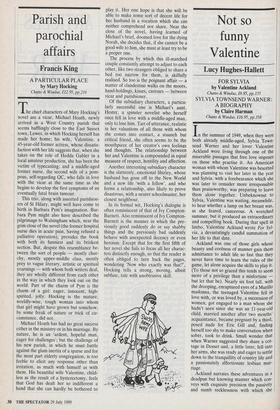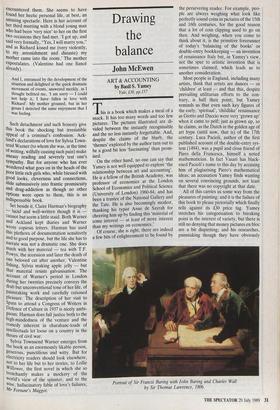Not so funny Valentine
Lucy Hughes-Hallett
FOR SYLVIA by Valentine Ackland Chatto (Cc Windus, £6.95, pp.135 SYLVIA TOWNSEND WARNER: A BIOGRAPHY by Claire Harman
Chatto &Windus, £16.95, pp.358
In the summer of 1949, when they were both already middle-aged, Sylvia Town- send Warner and her lover Valentine Ackland were living through one of the miserable passages that free love imposes on those who practise it. An American woman with whom Valentine was besotted was planning to visit her later in the year and Sylvia, with a forebearance which she was later to consider more irresponsible than praiseworthy, was preparing to leave them alone together. Unbeknownst to Sylvia, Valentine was waiting, meanwhile, to hear whether a lump on her breast was, as she feared, cancerous. A wretched summer, but it produced an extraordinary and compelling book. During that spell in limbo, Valentine Ackland wrote For Syl- via, a devastatingly candid summation of her life to that date.
Ackland was one of those girls whose beauty and coolness of manner gain them admittance to adult life so fast that they never have time to learn the rules of the game, let alone acquire the skills to play it. (To those not so graced this tends to seem more of a privilege than a misfortune — but let that be). Nearly six foot tall, with the drooping, enraptured eyes of a Murillo madonna, the teenaged Valentine fell in love with, or was loved by, a succession of women, got engaged to a man whom she hadn't seen since she was an 11-year-old child, married another after two months' acquaintance, became pregnant by a third, posed nude for Eric Gill and, finding herself too shy to make conversation when sober, took to drink. Small wonder that when Warner suggested they share a cot- tage in Dorset and, a little later, fell into her arms, she was ready and eager to settle down to the tranquillity of country life and a passionately affectionate lesbian mar- riage.
Ackland narrates these adventures in a deadpan but knowing manner which con- veys with exquisite precision the passivity and numb recklessness with which she encountered them. She seems to have found her hectic personal life, at best, an amusing spectacle. Here is her account of her third meeting with a blond young man Who had been 'very nice' to her on the first two occasions they had met. got up, and said very formally, "Yes, I will marry you," and as Richard kissed me (very violently,
to m- y astonishment and distaste) my
mother came into the room.' The mother expostulates. (Valentine had one fiancé already).
And I, entranced by the development of the situation and delighted at the quick dramatic movement of events, answered meekly, as I thought befitted me, I am sorry — I could not help it, I have fallen in love with Richard'. My mother groaned, but in her groan I detected the same enjoyment that was feeling.
Such detachment and such honesty give this book the shocking but irresistible appeal of a criminal's confession. Ack- land's declarations of love for Sylvia Town- send Warner (to whom she was, at the time of writing, wilfully causing such pain) make uneasy reading and severely test one's sYmpathy. But for anyone who has ever wondered what goes on in the heads of the Poor little rich girls who, while blessed with good looks, cleverness and connections, Slide submissively into frantic promiscuity and drug-addiction as though no other Options were open to them, this is an indispensable book.
Set beside it, Claire Harman's biography — lucid and well-written though it is — cannot but seem a little staid. Both Warner and Ackland kept diaries and Warner wrote copious letters. Harman has used this plethora of documentation sensitively and to good purpose, but the life she has to narrate was not a dramatic one. She does Much with her material — tea with T.F. Powys, the accession and later the death of one beloved cat after another, Valentine fishing, Sylvia making apple jelly — but that material resists galvanisation. The account of Warner's period in London during her twenties precisely conveys the drab but unconventional tone of her life, of Painstaking work and carefully rationed Pleasure. The description of her visit to Spain to attend a Congress of Writers in Defence of Culture in 1937 is nicely ambi- guous: Harman does full justice both to the high-mindedness of the venture and the medy inherent in charabanc-loads of intellectuals let loose on a country in the throes of civil war.
Sylvia Townsend Warner emerges from the book as an enormously likable person, generous, punctilious and witty. But for electricity readers should look elsewhere, not to her life but to her stories, to Lollie Willowes, the first novel in which she so trenchantly makes a mockery of the World's view of the spinster, and to the wise, hallucinatory fable of love's failures, Mr Fortune's Maggot.



















































 Previous page
Previous page